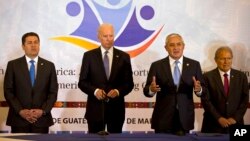In recent years, economic integration and the reduction of trade barriers have helped promote economic growth and development throughout the Western Hemisphere. But Central America risks being left behind. It remains far too slow and far too costly to move legal goods through Central America. An economically integrated Central America is more likely to attract the investment it needs and to be able to collaborate with North America and other markets in the global economy.
Guatemala, El Salvador, and Honduras face continuing economic and social challenges that have been worsened by rampant violence, corruption, and insecurity. The three countries cannot grow fast enough to reduce poverty, in part due to a lack of sufficient domestic and foreign investment.
In an effort to set their countries on a sustained, positive trajectory, the Presidents of El Salvador, Guatemala and Honduras last November signed the "Plan of the Alliance for Prosperity in the Northern Triangle." This initiative seeks to work with the private sector and civil society to boost economic growth in the region by attracting new trade and investment in more integrated ways and enhancing security by making justice systems more effective.
To make the most of their geographic advantage astride the crossroads of the hemisphere, Central American countries should reduce tariffs, invest in infrastructure and border management, streamline customs, improve tax collection, and partner with each other on issues like roads and energy.
In early March, Vice President Joe Biden met with the Presidents of Guatemala, Honduras, El Salvador, and representatives of the Inter-American Development Bank, to discuss the implementation of the Plan. The leaders publicly committed to actions that will advance the Plan. In his 2016 budget request, President Barack Obama is asking the U.S. Congress for $1 billion to support these countries’ efforts.
While the United States is investing significant resources, the success of this effort will depend far more on the political will of the Central American governments. Steps have been taken to demonstrate political will, such as the Government of Honduras signing a historic agreement with Transparency International. Guatemala could demonstrate similar will by extending the UN International Commission to Combat Impunity in Guatemala.
Economic growth will be sustainable in an inclusive environment where democratic values and institutions flourish, impunity is reduced, and civil society and the media can play their rightful roles. The quality of institutions will determine the quality of results. Now is the time for all to act.






